裕兴新概念英语笔记Lesson 73 The way to King Street
新概念英语73课讲义

Lesson 73 the way to King Street一、单词与短语week: n. 周;weekend:周末;London: n.伦敦;in London:在伦敦;Suddenly:adv.突然地;补充:all of a sudden=suddenly:突然地;bus stop:公共汽车站;补充:railway station:火车站;airport:飞机场;smile: v.微笑;wear smile:面带微笑;pleasantly:adv.愉快地;补充:have a pleasant time:玩得高兴;understand:v.懂,明白;补充:make oneself understood: 让别人了解自己;Speak:v.讲,说;speak后边常跟具体的语言,如说汉语:speak Chinese;说英语:speak English;hand: n.手;补充:raise your hand:举手;wave your hand:挥手;pocket:n.衣袋;phrase:n.短语;slowly: adv.缓慢地;二、短语、句型及语法1、She does not know London very well, and she lost her way.他对伦敦不很熟悉,因此迷了路;在本句中有两个知识点需要引起注意:①know、、、well:对、、、了解,例:I know him very well.我非常了解他;I do not know the book very well.我对这本书不是很了解。
②关于与way相关的几个重要短语:lose one′s way: 迷路;I lost my way yesterday:昨天我迷路了;on the way to、、、在去、、、的路上;例:Tom is on the way to school now.汤姆现在正在去学校的路上。
by the way:顺便提一下,顺便问一下,例:By the way, I have something to tell you.我顺便有些事情想告诉你。
新概念第一册词汇语法第73课:ThewaytoKingStreet.docx
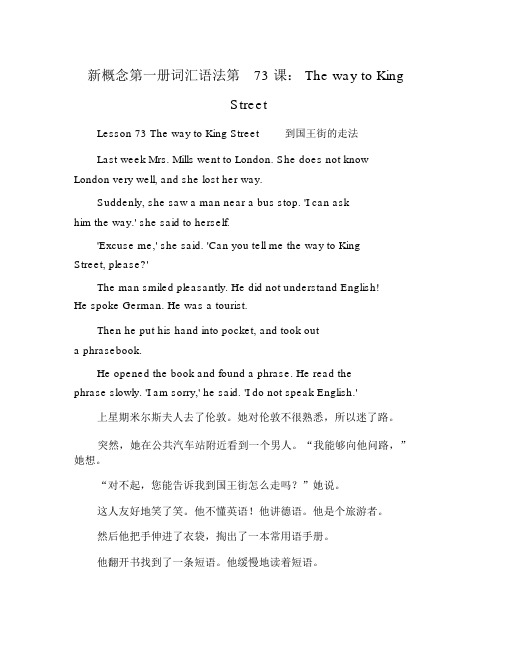
新概念第一册词汇语法第73 课: The way to KingStreetLesson 73 The way to King Street到国王街的走法Last week Mrs. Mills went to London. She does not know London very well, and she lost her way.Suddenly, she saw a man near a bus stop. 'I can askhim the way.' she said to herself.'Excuse me,' she said. 'Can you tell me the way to King Street, please?'The man smiled pleasantly. He did not understand English!He spoke German. He was a tourist.Then he put his hand into pocket, and took outa phrasebook.He opened the book and found a phrase. He read thephrase slowly. 'I am sorry,' he said. 'I do not speak English.'上星期米尔斯夫人去了伦敦。
她对伦敦不很熟悉,所以迷了路。
突然,她在公共汽车站附近看到一个男人。
“我能够向他问路,”她想。
“对不起,您能告诉我到国王街怎么走吗?”她说。
这人友好地笑了笑。
他不懂英语!他讲德语。
他是个旅游者。
然后他把手伸进了衣袋,掏出了一本常用语手册。
他翻开书找到了一条短语。
他缓慢地读着短语。
”很抱歉,“他,”我不会英。
” 1.She does not know London very well. 她敦不很熟悉。
新概念英语第一册第73课
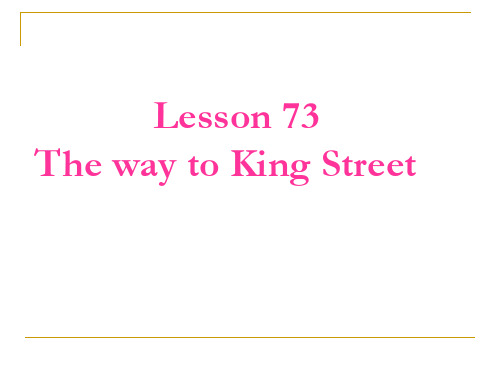
homework
1.听录音并跟读, 2.每个单词5遍,包括不规则动词
课文准备默写 3. 课课练
动词的过去式总结
一般来说,规则动词 v+ ed played, watched 等 以e结尾的动词, 直接+d telephoned, smiled, arrived 等 不规则动词 find-found, see-saw, speak-spoke, put-put
等 需要记忆
phrasebook /freɪz/ 短语手册
pocketˈ /pɒkɪt/ 口袋
speak /spiːk/ 说
watch the video and answer these questions.
Where did Mrs. Mill go last week? Why did the man need a phrasebook? What’s the man’s job(工作)? role playing
listen to the tape again
Last week Mrs. Mills went to London. She does not know London very well, and she lost her way.
Suddenly, she saw a man near a bus stop. 'I can ask him the way.' she sai way to King Street
Do you know the way to King Street?
Last week, Mrs. Mills wanted to go to King street, she didn’t know the way, either. Let’s see what happened?
裕兴新概念英语第二册笔记_第73课_单词讲解
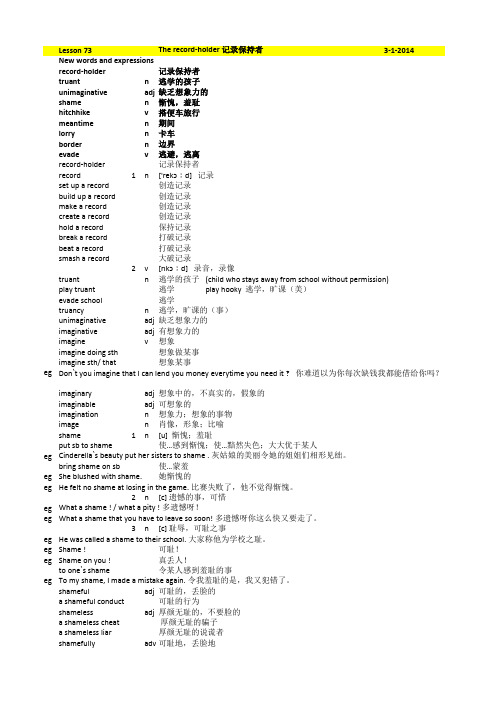
Lesson 733-1-2014New words and expressionsrecord-holder 记录保持者truant n 逃学的孩子unimaginative adj 缺乏想象力的shame n 惭愧,羞耻hitchhike v 搭便车旅行meantime n 期间lorry n 卡车border n 边界evade v 逃避,逃离record-holder 记录保持者record 1n *'rekɔːd] 记录set up a record 创造记录build up a record 创造记录make a record 创造记录create a record 创造记录hold a record 保持记录break a record 打破记录beat a record 打破记录smash a record 大破记录2v *rɪkɔːd] 录音,录像truant n 逃学的孩子play truant 逃学play hooky 逃学,旷课(美)evade school 逃学truancy n 逃学,旷课的(事)unimaginative adj 缺乏想象力的imaginative adj 有想象力的imagine v 想象imagine doing sth 想象做某事imagine sth/ that 想象某事eg imaginary adj imaginable adj 可想象的imagination n image n 肖像,形象;比喻shame 1n [u] 惭愧;羞耻put sb to shame 使…感到惭愧;使…黯然失色;大大优于某人eg Cinderella`s beauty put her sisters to shame . 灰姑娘的美丽令她的姐姐们相形见绌。
bring shame on sb 使…蒙羞eg She blushed with shame.她惭愧的eg He felt no shame at losing in the game. 比赛失败了,他不觉得惭愧。
新概念英语第一册第73-74课:The way to King Street
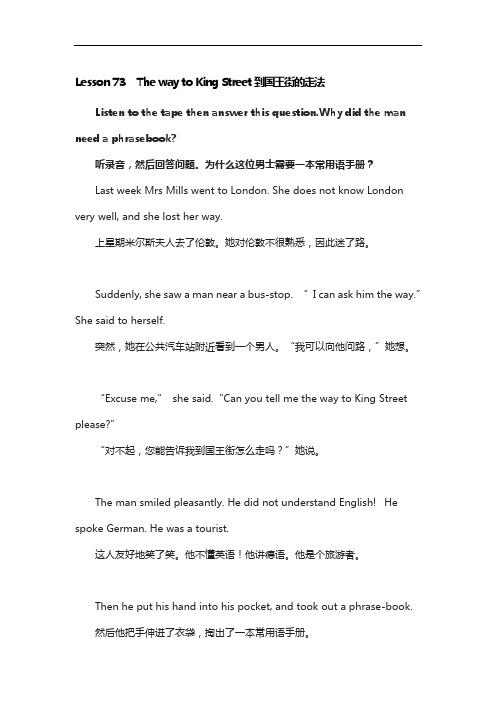
Lesson 73 The way to King Street到国王街的走法Listen to the tape then answer this question.Why did the man need a phrasebook?听录音,然后回答问题。
为什么这位男士需要一本常用语手册?Last week Mrs Mills went to London. She does not know London very well, and she lost her way.上星期米尔斯夫人去了伦敦。
她对伦敦不很熟悉,因此迷了路。
Suddenly, she saw a man near a bus-stop. “I can ask him the way.”She said to herself.突然,她在公共汽车站附近看到一个男人。
“我可以向他问路,”她想。
“Excuse me,”she said.“Can you tell me the way to King Street please?”“对不起,您能告诉我到国王街怎么走吗?”她说。
The man smiled pleasantly. He did not understand English! He spoke German. He was a tourist.这人友好地笑了笑。
他不懂英语!他讲德语。
他是个旅游者。
Then he put his hand into his pocket, and took out a phrase-book.然后他把手伸进了衣袋,掏出了一本常用语手册。
He opened the book and found a phrase. He read the phrase slowly. 他翻开书找到了一条短语。
他缓慢地读着短语。
“I am sorry,”he said. “I do not speak English.””很抱歉,“他说,”我不会讲英语。
新概念英语第一册课文默写 Lesson 73-143 word版-语法提示-高清打印
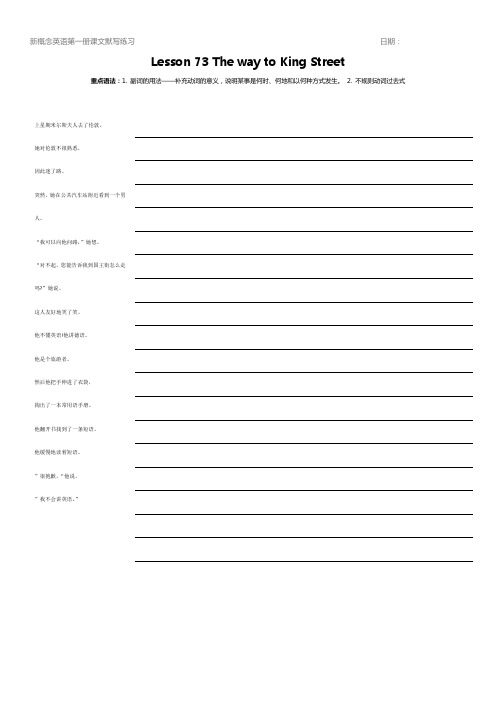
Lesson 73 The way to King Street重点语法:1. 副词的用法——补充动词的意义,说明某事是何时、何地和以何种方式发生。
2. 不规则动词过去式上星期米尔斯夫人去了伦敦。
她对伦敦不很熟悉,因此迷了路。
突然,她在公共汽车站附近看到一个男人。
“我可以向他问路,”她想。
“对不起,您能告诉我到国王街怎么走吗?”她说。
这人友好地笑了笑。
他不懂英语!他讲德语。
他是个旅游者。
然后他把手伸进了衣袋,掏出了一本常用语手册。
他翻开书找到了一条短语。
他缓慢地读着短语。
”很抱歉,“他说,”我不会讲英语。
”Lesson 75 Uncomfortable shoes重点语法:一般过去时与时间短语。
一般过去时通常与表示确切过去时间的短语连用。
女士:像这样的鞋子你们有吗?售货员:什么尺码的?女士:5号的。
售货员:什么颜色?女士:黑的售货员:对不起,我们没有。
女士:但是,我姐姐上个月买到了这样的一双。
售货员:她是在这儿买的吗?女士:不。
她是在美国买的。
售货员:一个月前我们有这要的鞋。
但是现在没有了。
女士:您能为我找一双吗?售货员:恐怕不行。
这鞋在去年和前年时兴.而今年已不流行了。
售货员:现在流行的是这种鞋子。
女士:这种鞋子看上去很不舒适。
售货员:的确很不舒适。
可是女人们总是穿不舒适的鞋子!Lesson 77 Terrible toothache重点语法:否定疑问句。
否定疑问句用来表示惊异、责难或赞叹,也可以表达某种建议、邀请、请求或看法。
护士:早上好,克罗夫特先生。
克罗夫特先生:早上好,护士。
我想见牙科医生。
护士:您约好了吗?克罗夫特先生:没有。
护士:急吗?克罗夫特先生:是的,很急。
我难受极了,牙痛得要命。
护士:您在4月24日星期一上午10点钟来行吗?克罗夫特先生:我必须现在就见牙科医生,护士。
护士:牙科医生这会儿很忙。
您下午两点钟来行吗?克罗夫特先生:那就太晚了。
牙科医生现在就不能给我看一下吗?护士:恐怕不能,克罗夫特先生。
新概念英语第一册73课lesson73thewaytoking

The composition of coordinate sentences
Each clause in a coordinate sentence has its own subject and verb, and the clauses are of equal grammatical importance.
The subject of a simple sentence can be a noun or pronoun, and the predicate includes the verb and any complements or
adjuncts.
Simple sentences can be declarative, interrogative, or imperative in form.
Sentence Analysis
• "We set off on our hike with high spirits, excited about the adventure ahead." - This sentence sets the scene for the story and introduces the main characters - a group of friends excited about their upcoming adventure. It also suggests that they are in a positive mood and ready to face any challenges that may come their way.
新概念英语第一册课文翻译及学习笔记Lesson73
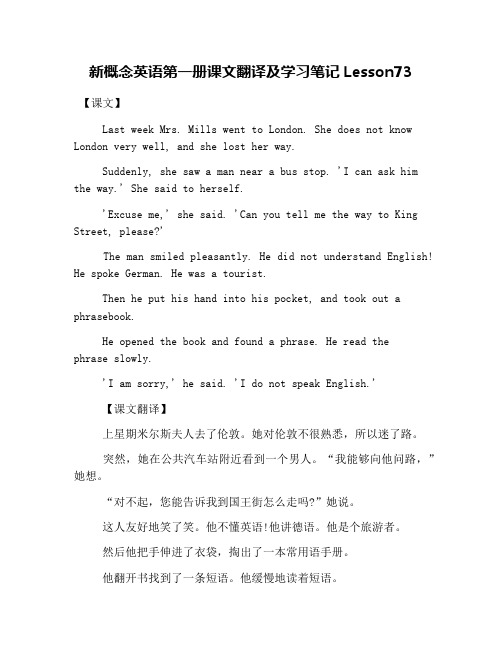
新概念英语第一册课文翻译及学习笔记Lesson73【课文】Last week Mrs. Mills went to London. She does not know London very well, and she lost her way.Suddenly, she saw a man near a bus stop. 'I can ask him the way.' She said to herself.'Excuse me,' she said. 'Can you tell me the way to King Street, please?'The man smiled pleasantly. He did not understand English! He spoke German. He was a tourist.Then he put his hand into his pocket, and took out a phrasebook.He opened the book and found a phrase. He read thephrase slowly.'I am sorry,' he said. 'I do not speak English.'【课文翻译】上星期米尔斯夫人去了伦敦。
她对伦敦不很熟悉,所以迷了路。
突然,她在公共汽车站附近看到一个男人。
“我能够向他问路,”她想。
“对不起,您能告诉我到国王街怎么走吗?”她说。
这人友好地笑了笑。
他不懂英语!他讲德语。
他是个旅游者。
然后他把手伸进了衣袋,掏出了一本常用语手册。
他翻开书找到了一条短语。
他缓慢地读着短语。
“很抱歉,” 他说,“我不会讲英语。
”【生词】week n. 周London n. 伦敦suddenly adv. 突然地bus stop 公共汽车站smile v. 微笑pleasantly adv. 愉快地understand (understood ) v. 懂,明白speak (spoke ) v. 讲,说hand n. 手pocket n. 衣袋phrasebook n. 短语手册,常用语手册phrase n. 短语slowly adv. 缓慢地【知识点讲解】在新概念一的课本里,73课前面有一个小测试,有书的同学能够自己做一下检验一下学到现在的水平。
- 1、下载文档前请自行甄别文档内容的完整性,平台不提供额外的编辑、内容补充、找答案等附加服务。
- 2、"仅部分预览"的文档,不可在线预览部分如存在完整性等问题,可反馈申请退款(可完整预览的文档不适用该条件!)。
- 3、如文档侵犯您的权益,请联系客服反馈,我们会尽快为您处理(人工客服工作时间:9:00-18:30)。
Lesson 73 The way to King Street一、N ew words and expressionsweek n. 周Monday 星期一Tuesday 星期二Wednesday 星期三Thursday 星期四Friday 星期五Saturday 星期六Sunday 星期天There are seven days in a week.. Monday , Tuesday, Wednesday, Thursday , Friday , Saturday and Sunday. 一个星期有七天,星期一,星期二,星期三,星期四,星期五,星期六,星期天。
weekday n 平日工作日(星期一至星期五)on weekdays 在平日在工作日Either my father or my mother cooks dinner on weekdays. weekend n 周末(星期五晚上至星期日晚上)at weekends 在周末weekly1) adj.每周一次的a weekly wage 周薪2) adv. 每周一次地I go to the swimming pool weekly. 我每周去一次游泳馆。
FAST MEMORIZATION三毛在撒哈拉大沙漠整一个week(星期)把水源seek(寻找)以泪洗cheek(脸)流泪(weep)不止,长达一周(week)每过一个week(星期)老人总会weep(哭泣)London n 伦敦I come from London. 我来自伦敦What‟s the climate like in London?We arrived in London yesterday? 我们昨天到达了伦敦。
sudden adj 突然的意外的suddenly adv 突然地He suddenly came in 他突然进来了。
Suddenly, they screamed. 他们突然尖叫起来。
bus stop 公共汽车站at the bus stop 在公共汽车站I often see him at the bus stop.我经常在公共汽车站见到他。
railway station 火车站at the railway station 在火车站airport 飞机场at the airport 在飞机场smile1)v 微笑(注意smile和smell发音的区别)I smiled at the children and said “hello”. 我微笑地与孩子们打招呼。
2)n 微笑give sb. a friendly smile 对某人友好地微笑3)laugh & smilelaugh 出声地笑,大笑smile 微笑He always laughs loudly 他总是大声地笑Laugh at…嘲笑某人Don‟t laugh at others. 不要嘲笑别人FAST MEMORIZATION老师这个生动贴切的比喻(simile)引得大家会心一笑(smile)。
一个恰当的比喻(simile)会引来会心一笑(smile)s[四]+ mile(英里)演员一个微笑可感染四英里内人群Having piled miles of files ,she smiled a while堆了几英里长的文件之后,她笑了一会Having piled miles of files, she smiled a while silently.堆了几英里的文件之后,她默然笑了一会儿。
pleasantly adv 愉快地He smiled pleasantly. 他亲切的微笑pleasant ['plezənt]adj. 令人愉快的,舒适的;讨人喜欢的,和蔼可亲的The climate here is very pleasant. 这儿的气候非常的宜人。
Understand understood v 懂,明白The book is very hard to understand. 这本书很难懂。
I don‟t understand Italian 我不懂意大利语My grandmother understood Russian when she was alive. 我的奶奶在世的时候懂俄语FAST MEMORIZATIONunder(在……下面)+ stand(站立,站在)在下面站着,把上面看得明明白白speak spoke v讲说发言He can speak three languages Chinese, English and French.他会将三种语言汉语、英语、法语。
Who are going to speak at the meeting? 谁将在会上发言?speak ill of sb. 说某人的坏话Don‟t speak ill of others. 别说别人的坏话。
He spoke ill of our boss yesterday. 他昨天讲我们老板的坏话。
FAST MEMORIZATION客机迫降飞机油箱leak(漏)降落山的peak(顶峰)满目都是bleak(荒凉的)对荒草一speak(说话)身体变得weak(虚弱)把乘客的steak(牛排)夜晚起来sneak(偷偷地拿)hand n 手second hand 二手I bought a second hand car.give sb a hand 帮某人的忙Can you give me a hand? 你能帮我一下吗?pocket n 衣袋I can‟t find the key in my pocket. 我在衣袋里找不到钥匙。
pocket moneyphrasebook n. 短语手册常用语手册phrase n 短语slowly adv 缓慢的Last week Mrs. Mills went to London. She does not know London very well, and she lost her way.1)用在过去事态的时间状语last week last year last month2)went是go的过去式I went shopping with my mother last week. 上周我和妈妈逛商店了。
He was ill yesterday, so he didn‟t go to school.(一般过去时否定句用didn‟t , 后面谓语动词要用原形,所以把went变回原形。
)1)know ... well 对某人/某地方了解熟悉Eg. Do you know him well? 你了解他吗?Eg. I don‟t know Italy very well.2)and 当“所以”讲,表示结果。
3)lost是lose的过去式4)lose v 丢失eg. I lost my key the day before yesterday.5)lose one‟s way 迷路了6)way n 路方法on the way home 在回家的路上eg. Excuse me. Which is the way to the No. 22 bus stop? 对不起,打搅一下,请问去22路公共汽车站的路怎么走?eg. I must find a way to solve the problem. 我必须找到解决问题的办法。
Suddenly , she saw a man near a bus stop. …I can ask him the way‟, she said to herself.1)suddenly adv . 突然地sudden(adj)+ly=suddenly(adv.)quick(adj)+ly=quickly(adv.)pleasant(adj.+ly=pleasantly(adv.)2)saw是see的过去式I saw a pretty lady near the office building yesterday afternoon..昨天下午我在办公大楼附近看见一位非常漂亮的女士。
I didn‟t see him all day yesterday. 我昨天一整天都没有看见他一般过去时的否定时用didn‟t ,后面的动词要用原形。
1)ask sb the way 向某人问路eg Can I ask you the way to the reailway station?请问去火车站的路怎么走?2)said是say的过去式3)say to oneself 心中暗想(不出声)talk to oneself 自言自语地说(出声了,只不过声音很小)…Excuse me ,‟ she said.‟ Can you tell me the way to King Street, please?‟1)she said 表示她说,后面一般接说话的内容。
2)Can you tell me the way to the railway station?用来问路3)Tell sb the way 告诉某人(去…的路)4)类似问路的表的方法:Could you please tell me how to get to the airport?你可不可以告诉我去机场的路怎么走啊?Can you tell me how to get to King Street, please?Excuse me. How can I get to the No. 11 bus stop?对不起,打扰一下,请问你11路公共汽车站的路怎么走啊?Do you know the way to King Street , please?Excuse me, can you tell me where the railway station is? 对不起,请问火车站在哪儿? Excuse me, could you tell me which is the way to the nearest hospital? 请问去最近的医院怎么走?Excuse me, would you please show me the way to the post office? 请告诉我去邮局怎么走好吗? Excuse me, would you mind telling me the way to the police station? 对不起,请告诉我去警察局怎么走好吗?Excuse me, I wonder if you could do me a favour. I‟m looking for the police station? 对不起,不知能否帮我,我在找警察局。
